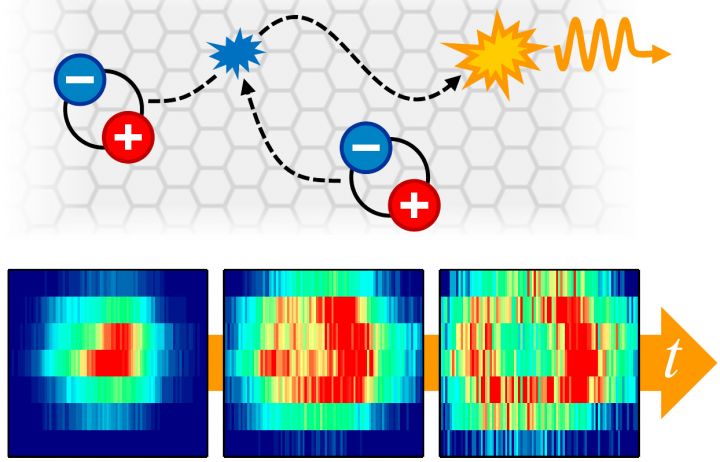
Phys. Rev. Lett. 120, 207401 (2018)
In a recent work by the research group of Alexey Chernikov in collaboration with Regensburg teams of Tobias Korn and Nicola Paradiso as well as with Mikhail M. Glazov from the Ioffe Institute, the transport of spin-polarizable, light-emitting exciton quasiparticles is demonstrated at room temperature. The study shows pronounced non-linear propagation of excitons in 2D materials and provides strong evidence for intriguing memory effects in their dynamics. It has recently appeared in Physical Review Letters (Kulig et al., Phys. Rev. Lett. 120, 207401 (2018)) and was highlighted as editor's suggestion.
We directly monitor exciton propagation in freestanding and S i O 2 -supported W S 2 monolayers through spatially and time-resolved microphotoluminescence under ambient conditions. We find a highly nonlinear behavior with characteristic, qualitative changes in the spatial profiles of the exciton emission and an effective diffusion coefficient increasing from 0.3 to more than 3 0 c m 2 / s , depending on the injected exciton density. Solving the diffusion equation while accounting for Auger recombination allows us to identify and quantitatively understand the main origin of the increase in the observed diffusion coefficient. At elevated excitation densities, the initial Gaussian distribution of the excitons evolves into long-lived halo shapes with ???? m -scale diameter, indicating additional memory effects in the exciton dynamics.
https://journals.aps.org/prl/abstract/10.1103/PhysRevLett.120.207401
SFB 1277
Doris Meier
Universität Regensburg
Phone: +49 (0) 941-943 2264
Email: SFB1277.Office@ur.de